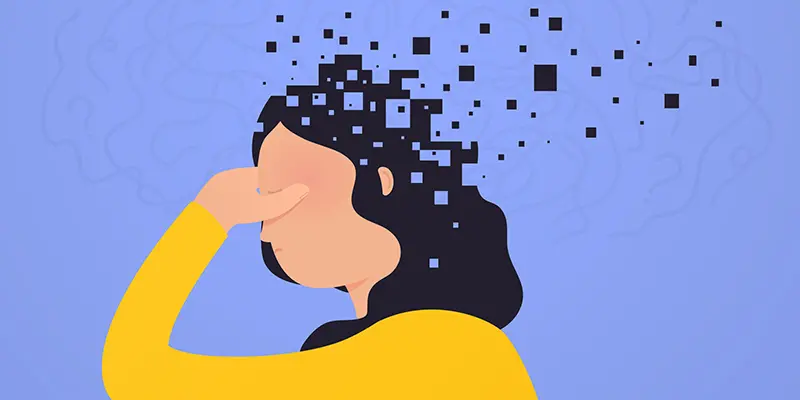
Are you feeling mentally sluggish? Struggling with fuzzy thinking? Feeling less sharp than usual? These are things we may all experience from time to time, but if they have become persistent, they may signal trouble. How can you be sure if it’s just brain fog or if it’s a sign of dementia? It can be difficult to know as they both share some common symptoms, including:
- Memory problems
- Trouble with focus or concentration
- Difficulty processing information
- Trouble problem-solving
- Confusion or disorientation
- Decreased visual and spatial skills
- Trouble finding words
With so many overlapping symptoms, it can be confusing to know the difference between brain fog and dementia. Learning more about each of these terms can help.
With so many overlapping symptoms, it can be confusing to know the difference between brain fog and dementia.WHAT IS BRAIN FOG?
Brain fog isn’t a mental health condition but rather a term used for a lack of mental clarity. This common issue that can affect anyone for a variety of reasons is often temporary but may linger in some cases. To overcome brain fog, it’s important to identify the underlying cause. Potential causes of brain fog include:
Long COVID
People who experience lingering cognitive symptoms after recovering from COVID-19 are called long-haulers, and brain fog is one of the common symptoms. For example, a 2020 study in the Journal of Psychiatric Research found that people who had recovered from COVID-19 showed cognitive impairments that may be associated with inflammation caused by the virus.
Head trauma
Past head injuries—even mild traumatic brain injuries (TBIs) that don’t cause a person to black out—can lead to a variety of cognitive and psychological issues months or years after the injury. If brain fog symptoms don’t subside, it’s a good idea to investigate if a long-forgotten blow to the head might be contributing to your issues. Brain SPECT imaging is a functional neuroimaging technology that can reveal damage to the brain related to past head trauma.
ADD/ADHD
Some brain fog symptoms—such as forgetfulness, distractibility, difficulty concentrating, poor planning, and disorganization—may be related to undiagnosed ADD/ADHD.
Depression
Being depressed is associated with many symptoms seen in brain fog, such as feeling mentally sluggish, having trouble concentrating, and having a hard time remembering things.
Hormonal abnormalities
Having hormonal imbalances—such as low levels of thyroid, testosterone, or estrogen—is associated with mental fog, forgetfulness, and other cognitive issues.
Toxic mold exposure
In some people, being exposed to toxic mold is the root cause of the cognitive dysfunction seen in brain fog.
Lyme Disease
Troubles with memory, problem-solving, and paying attention—all brain fog symptoms—may be related to Lyme disease.
Chronic or intense stress
When you get stuck in stress mode, your body releases too much cortisol, which negatively impacts the brain and can leave you feeling mentally sluggish.
Medications
Several common sleep aids, antacids, and prescription medications are associated with detrimental cognitive effects.
Lack of sleep
Just one single night of tossing and turning can cause you to feel mentally fatigued. Research in Nature Medicine shows that when sleep deprivation becomes chronic, it interferes with neurons’ ability to communicate, causing cognitive issues that disrupt memory and other functions.
Food sensitivities
Some people are highly sensitive to certain foods, such as artificial dyes, MSG, soy, corn, dairy, sugar, and gluten. For these individuals, consuming such foods can lead to mental fatigue, trouble paying attention, and slowed thinking.
Blood sugar imbalances
Elevated blood sugar levels, which are common in people with diabetes, damage blood vessels and negatively impact circulation. This can reduce blood flow to the brain, which can lead to fuzzy thinking and memory loss. On the other end of the spectrum, low blood sugar levels mean the brain may not be getting enough glucose to function properly, making it difficult to concentrate.
WHAT IS DEMENTIA?
Dementia is a general term for a group of degenerative neurological conditions that impact brain function and lead to cognitive impairment. There are several types of dementia, including:
Alzheimer’s disease
The most common, well-known, and dreaded form of dementia, Alzheimer’s accounts for approximately 60%-80% of all dementias. Currently, it affects an estimated 6.5 million Americans. By 2050, that number is expected to reach 13 million. On brain SPECT imaging, low blood flow is the #1 predictor of Alzheimer’s disease.
Frontal-temporal lobe dementia
Accounting for an estimated 5% of all dementias, this type is associated with decreased blood flow to the brain’s frontal lobes and temporal lobes, areas involved in thinking, memory, judgment, behavior, and more.
Alcohol-related dementia
This form of the condition is caused by excessive drinking or alcohol abuse. On SPECT, it is common to see widespread decreased blood flow with this form of dementia.
Vascular dementia
Accounting for up to 10% of all dementias, this form develops due to damaged or blocked blood vessels that reduce circulation to the brain.
Normal pressure hydrocephalus
With this type of dementia, fluid builds up in the brain, leading to enlarged ventricles that cause pressure on regions of the brain involved in cognitive processes and other functions. SPECT imaging can help detect brain patterns related to this condition, which is treatable when detected early.
Pseudodementia
In some people, dementia-like symptoms may be caused by another undiagnosed condition, such as depression. SPECT imaging can be very helpful in identifying other underlying conditions to ensure you get the most effective treatment.
EVALUATING BRAIN FOG AND DEMENTIA
If you’re experiencing mental sluggishness, confusion, or trouble concentrating, take it seriously. To help determine if your symptoms are due to brain fog or dementia, it’s important to get a comprehensive evaluation that includes brain SPECT imaging, lab work, and your personal history. Only with all of this valuable information can you receive an accurate diagnosis, so you can get the most effective treatment plan.
Memory problems, brain fog, cognitive dysfunction, and other mental health issues can’t wait. At Amen Clinics, we’re here for you. We offer in-clinic brain scanning and appointments, as well as mental telehealth, clinical evaluations, and therapy for adults, teens, children, and couples. Find out more by speaking to a specialist today at 888-288-9834 or visit our contact page here.





That explanation was very concise and thorough. Thank you!
Comment by Dorrin B. Rosenfeld — July 25, 2022 @ 4:57 PM
Certain autoimmune diseases, such as Fibromyalgia, can also cause brain fog; we refer to it as "fibro fog".
Comment by Marianne Viola — July 26, 2022 @ 12:44 AM
thank you for the explanation!
Comment by Doug Morris — June 1, 2023 @ 2:27 PM
I can’t afford to come to amen clinic I desperately need help is there financial assistance and I also had 2 pets and diff diagnosis please how can I get
Help I’m a mom with a disabled husband and did health care for 20 yrs and after covid I can’t we
Struggle just to take care of our fam right now financially u called before and there was no assistance how can I get help docs say they can’t
Angelina
Comment by Angelina Ruark — July 22, 2023 @ 10:05 AM